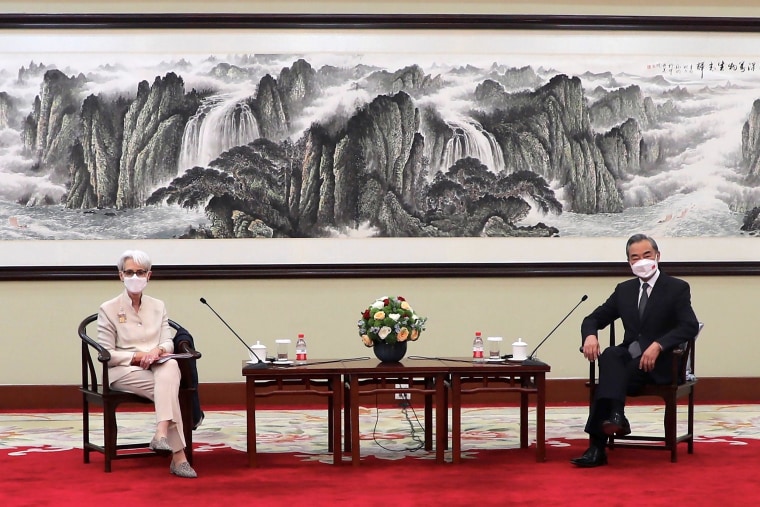China blamed the United States on Monday for a "stalemate" in two-way ties, accusing it of creating an "imaginary enemy", and setting a confrontational tone during a meeting with Deputy Secretary of State Wendy Sherman.
Sherman, the second-ranked U.S. diplomat, arrived on Sunday for the rare face-to-face talks in the northern city of Tianjin amid worsening relations between the world's two largest economies.
"U.S.-China relations are in a standstill and face serious difficulties," Vice Foreign Minister Xie Feng was quoted as saying during the meeting by state television.
"The United States wants to reignite the sense of national purpose by establishing China as an 'imaginary enemy.'"

Later, during a meeting with Foreign Minister Wang Yi, a member of the state council, or China's cabinet, Sherman a series of Chinese actions that "run counter to our values and interests and those of our allies and partners, and that undermine the international rules-based order."
"In particular, she raised our concerns about human rights, including Beijing’s anti-democratic crackdown in Hong Kong; the ongoing genocide and crimes against humanity in Xinjiang; abuses in Tibet; and the curtailing of media access and freedom of the press. She also spoke about our concerns about Beijing’s conduct in cyberspace; across the Taiwan Strait; and in the East and South China Seas," according to a statement released by the State Department.
Sherman's China visit was added late to an Asian itinerary that included stops in Japan, South Korea and Mongolia amid wrangling over protocol between Beijing and Washington.
Download the NBC News app for breaking news and politics
On Saturday, Wang had warned that China would not accept the United States taking a "superior" position in the relationship, a day after China announced sanctions on former U.S. Commerce Secretary Wilbur Ross and others.
Senior U.S. officials had outlined Sherman's expected position during the talks, saying the United States welcomed competition with Beijing but would insist on a level playing field and "guardrails" to avoid conflicts.
The U.S. government and lawmakers have been critical of China's policy in Hong Kong and Xinjiang, with the U.S. Senate having passed a bill this month to ban imports from the far western region, citing forced labour concerns.
Monday's meeting took place amid frayed relations between Beijing and Washington that have worsened in the months since an initial diplomatic meeting in March in Anchorage, the first under President Joe Biden's administration.
At the Alaska meeting, Chinese officials, including Wang, railed against the state of U.S. democracy, while U.S. officials accused the Chinese side of grandstanding.
Monday's talks were held amid stringent Chinese COVID-19 measures, which have meant that visiting foreign officials have met Chinese counterparts outside Beijing, the capital.
Foreign media were kept at a distance from the hotel where the talks took place, but Chinese media were permitted on the premises.